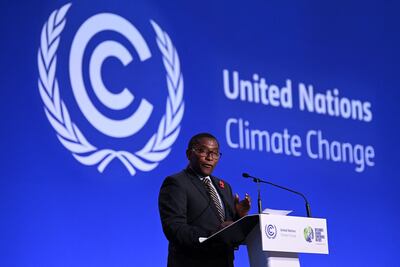A top UN official has warned of a “crisis of political will” holding the world back in the fight against climate change.
Selwin Hart, a special adviser on climate to UN Secretary General Antonio Guterres, warned current leaders that the fate of climate goals will be settled on their watch.
Diplomats in London were told politics is the last major stumbling block as economic and technological barriers to a cleaner future fall.
“The decisions, the actions and choices made and taken by leaders today will determine the world of tomorrow,” Mr Hart said.
They were urged to get smart about winning political backing for green action and offering a “more positive narrative” about net zero.
The rise of cheap renewable energy such as wind and solar has lifted hopes of cutting carbon dioxide emissions before global warming gets out of control.
But countries are under pressure to put trillions of dollars behind that effort despite economic turmoil and pressing political needs at home.
The US, UK and France are all in the midst of election campaigns while the EU is in a phase of post-election horse-trading after a backlash against green policies.
However, countries were urged to get money flowing in what a German diplomat called a “golden window” in which there are economic benefits to seize.
“Climate-related policies cannot be climate-only policies. Instead, they need to be designed to maximise economic gain and social benefit,” Germany's top climate envoy Jennifer Morgan told a summit in London.
“Only then can we see the pace and scale of transition needed, and to go full realpolitik, limit the opportunity for political point-scoring that threatens to derail or delay the transition.”
Climate deadlines are approaching such as a 2025 date for almost 200 countries to submit new long-term green plans, based on what was agreed at Cop28 in the UAE at the end of last year.

Mr Hart told the event at the City of London's Mansion House that the battle to keep global warming to 1.5°C above pre-industrial levels – the world's key climate goal – “will be won or lost under their watch”.
“Despite the very clear economic case for urgency and ambition, we're simply not moving fast enough. In my view the climate crisis is a crisis of political will,” said Mr Hart.
“Climate politics and diplomacy is currently taking place against a backdrop of three really important forces: geopolitical divisions, a genuine leadership void, and mistrust between the developed and developing world.”
Finance debate
The split between the global north and south is threatening to burst back into full view at this year's Cop29 talks in Azerbaijan in November.
Tricky negotiations are expected on finance after small island states proposed a new funding goal in the trillions of dollars to be provided by rich countries.
Rich-world budgets are under pressure, with the UK's Labour Party on Tuesday criticising the ruling Conservatives for cutting development aid to the global south.
Labour is promising a renewed focus on clean energy if it wins power at the July 4 general election – which it is widely predicted to do – but has scaled back funding pledges due to economic strife.

Kevin Magron, a French climate ambassador, said politicians should offer a “more desirable future to people” and a “more positive narrative” around tackling climate change.
He said people should not see climate action as “imposed on populations and societies” and “something which we're going to suffer”'.
Nick Mabey, a climate adviser to former UK prime minister Tony Blair, warned green policies could become less popular if they appear not to be working as environmental hazards rise.
“We think that the main barriers to achieving the climate action we need is not economics, it's not tech, it's politics and institutional change,” he said.
“As the technology has become cheaper and better, the pol barriers have become so much more important.
“Unlike most normal political problems, if we don't solve climate change quickly, we don't solve it at all. That's not true for poverty, it's not true for inequality.”


